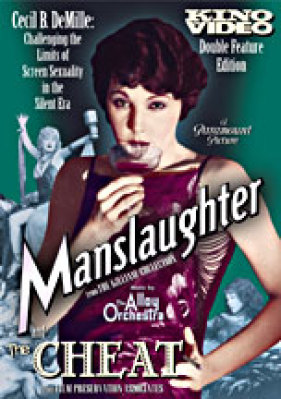Manslaughter & The Cheat (DVD)
The Cheat
A rare phenomenon of the American cinema, Cecil B. DeMille's The Cheat is a film that continues to arrest, arouse and enthrall a full eight decades after its original release.Establishing a narrative formula that he would cling to in years to come -- whether in gargantuan biblical epics or fables of modern age decadence -- DeMille wove the tale of a wayward wife whose impulsive indiscretions propel her into public scandal, private shame and marital turmoil. Gambling away the Red Cross funds she has been entrusted with, the social climbing Edith Hardy (Fannie Ward) must turn to an Asian ivory trader (Sessue Hayakawa) to cover the loss and save her reputation among the "Long Island smart set." Only later does Edith realize that by accepting the loan she has become Arakau's property, signified by a brand he burns into her naked back. In a state of hysteria, Edith shoots her captor, a crime that is pinned on her husband Richard (Jack Dean).
Cinematographer Alvin Wyckoff and designer Wilfred Buckland, who had previously worked under legendary stage producer David Belasco, improvised a form of minimalist, Rembrandt-like lighting that bathed the characters in darkness but for a single source of illumination from the side -- a dramatic effect that would become known as "Lasky lighting," after the production company that made The Cheat. The result is a visual style that superbly complements the film's dark sexual undercurrents.
Although Fannie Ward was ostensibly the star of The Cheat, it was Hayakawa (later an Academy Award© nominee for The Bridge on the River Kwai) who emerged as the true attraction. As Valentino would years later, the exotic Japanese actor tapped into a vein of post-Victorian female masochism, eroticism and fashionable Orientalism of the day, fulfilling many women's taboo desires to be seduced and possessed by a man of another race.
Along with The Cheat, Kino on Video presents an abridgement of Maurice Tourneur's fascinating comedy A Girl's Folly (U.S. 1917. 30 mins. Tinted B&W.), depicting life behind the scenes at a 1917 movie studio. "The public should be greatly interested in seeing how moving pictures are made -- it is all here," Variety commented, "but whether it is good for the picture business or not to show these things is another question."
Manslaughter
In the silent era, Cecil B. DeMille stood at the forefront of Hollywood directors, a visual stylist who created fashionable fables of women caught in tempests of temptation.Accompanied by a lively score by the Alloy Orchestra, Manslaughter stars Leatrice Joy as a pampered debutante who is forced to confront her irresponsible lifestyle when she causes the death of a traffic cop. The prosecutor who sends her to jail (Thomas Meighan) is also in love with the reckless woman, and is tormented with guilt for having betrayed her.
To emphasize the debauchery of the Jazz Age elite, DeMille interwove scenes of champagne-soaked parties and Roman orgies, a device that served as a stern warning to the wayward youth of America, even as it provided a titillating spectacle to the sensation-hungry masses.
In the silent era, Cecil B. Demille stood at the forefront of Hollywood directors, a visual stylist who created fashionable fables of women caught in tempests of temptation.
Accompanied by a lively score by the Alloy Orchestra, MANSLAUGHTER stars Leatrice Joy as a pampered debutante who is forced to confront her irresponsible lifestyle when she causes the death of a traffic cop. To emphasize the debauchery of the Jazz Age elite, DeMille interwove scenes of champagne-soaked parties and Roman orgies, a device that served as a stern warning (while providing a titillating spectacle) to the wayward youth of America.
Mixed messages also abound in THE CHEAT, in which a society woman (Fannie Ward) allows a wealthy Burmese trader (Sessue Hayakawa) to settle her debt for her, not realizing that in exchange he intends to brand her flesh as his own. Highly influential for its dramatic low-key lighting and its frank depiction of extra-marital intrigue, THE CHEAT tapped into a vein of post-Victorian female masochism, eroticism and Orientalism of the day, exploring the taboo desire to be forcefully seduced and possessed by a man of another (as in Rudolph Valentino's SHEIK films several years later).
The Cheat
- Cecil B. DeMille - Director
- Sessue Hayakawa - Actor
- Fannie Ward - Actor
- Jack Dean - Actor
Manslaughter
- Cecil B. DeMille - Director
- Leatrice Joy - Actor
- Alloy Orchestra - Composer
Reviews
"One of the great accomplishments of the American cinema." - René Clair
For press and publicity inquiries, please email press@kinolorber.com. A selection of press materials for this title may be available for download here.

